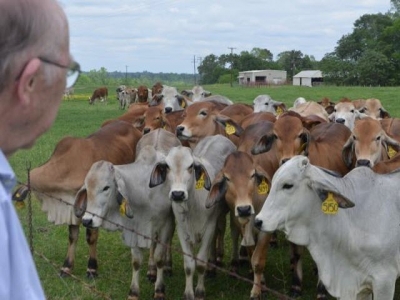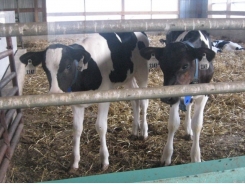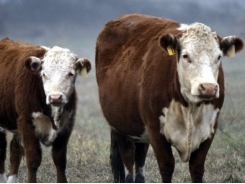Prenatal stress may alter cattle behavior

Grant will fund research to identify effects of prenatal stress on beef cattle DNA, white blood cells, other tissue and subsequent changes in genetics related to temperament.
Dr. Ron Randel, Texas A&M AgriLife Research physiologist looks over a herd of purebred Brahman heifers at the North Farm near the Texas A&M AgriLife Research & Extension Center in Overton, Texas. (Texas A&M AgriLife Extension Service photo by Adam Russell)
Temperamental cattle are more difficult to manage, so producers look for genetic markers that indicate docility, according to Texas A&M AgriLife Research physiologist Dr. Ron Randel.
A new $382,800 federal grant will fund research to identify the impact of prenatal stress on beef cattle DNA, white blood cells and other tissue and subsequent changes in genetics related to temperament, Randel said, adding that the three-year grant will finance research focused on the “effect of prenatal stress on DNA methylation and correspondence with gene expression in cattle” at the Texas A&M AgriLife Research & Extension Center in Overton, Texas.
The research team includes Drs. Penny Riggs, David Riley and Thomas Welsh from the animal science department at Texas A&M University. Funding was provided by the U.S. Department of Agriculture's National Institute of Food & Agriculture.
Randel said the research will follow previous studies of Brahman cattle herds he and others conducted at the center, which found that stress pregnant cows experienced affected calves in utero, making them more aggressive than calves born to unstressed mothers.
“Stress causes changes in unborn fetuses, and those changes are expressed after the animal is born,” he said. “This is a big deal because it shows there are behavioral changes that affect the way DNA causes RNA to function.”
Randel also studied stored white blood cells from 28-day-old calves to examine the methylation patterns of the animals’ DNA. He found major differences in those patterns in a significant number of genes important for animal production and health.
Methylation is a process that adds methyl groups to DNA molecules and can change the activity of a DNA segment.
Randel explained, “The questions this grant will answer are: ‘Are there differences that remain through maturity affecting the function of both DNA and RNA, which is how the genetic code is expressed, and are they modified by more or less methylation of the DNA?’”
He said this discovery is important because a number of genetic markers have been identified that cattle breeders use to make breeding selections based on DNA sequences.
“At this point, we don’t know how many markers are affected, but we know that markers tied to stress responsiveness -- or temperament -- are affected by environmental conditions,” Randel said. “That says the way animals perform under certain stress will not be as predictable by DNA analysis in using those markers. It brings into question the value of using DNA markers without the knowledge of environmental factors that can affect the mother and, therefore, the offspring.”
Randel’s research into how this affects temperament began in 2011. Test cows were moved five times during pregnancy in 20-day intervals from day 60 of the pregnancy, he said.
At this point, Randel said his research has not identified how these changes in the DNA hold up as the animal reaches maturity. However, the grant research will answer the question of whether the changes in methylation at 28 days are the same once the animal reaches adulthood.
The study will also answer whether changes in white blood cells are the same as changes in other tissue that regulate hormones controlling stress responsiveness, Randel said.
“While DNA is immutable, the function of the DNA is not immutable,” he said. “This is one possible mechanism that could be functioning to prepare an organism for a changing environment, and the change in temperament may, in fact, be a mechanism by which the animal is prepared to live in a more stressful environment.”
Randel said researchers are already studying how stress responsiveness affects rodent offspring, and scientists are interested in looking at mechanisms and similar coding in humans.
“This research is a big deal,” he said. “It will have immediate impacts on cattle production and the way producers breed and handle their animals, but there are also implications that could be tied to other mammals, including humans, when it comes to prenatal stress and its effect on behavior.”
Related news
Tools

Phối trộn thức ăn chăn nuôi

Pha dung dịch thủy canh

Định mức cho tôm ăn

Phối trộn phân bón NPK

Xác định tỷ lệ tôm sống

Chuyển đổi đơn vị phân bón

Xác định công suất sục khí

Chuyển đổi đơn vị tôm

Tính diện tích nhà kính

Tính thể tích ao




 Manipulation of metabolic development of calves is possible:…
Manipulation of metabolic development of calves is possible:…  Mammary stem cells challenge costly bovine disease
Mammary stem cells challenge costly bovine disease